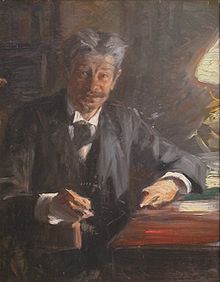Georg Brandes
| Georg Brandes | |
|---|---|

Georg Brandes, sketch for a painting by P.S. Krøyer, 1900
|
|
| Born | Georg Morris Cohen Brandes 4 February 1842 Copenhagen, Denmark |
| Died | 19 February 1927 (aged 85) Copenhagen, Denmark |
| Occupation | Critic |
| Nationality | Danish |
| Education | University of Copenhagen |
| Relatives | Edvard Brandes (brother) |
|
|
|
| Signature |  |
Georg Brandes (4 February 1842 – 19 February 1927), born Morris Cohen, was a Danish critic and scholar who greatly influenced Scandinavian and European literature from the 1870s through the turn of the 20th century. He is seen as the theorist behind the "Modern Breakthrough" of Scandinavian culture. At the age of 30, Brandes formulated the principles of a new realism and naturalism, condemning hyper-aesthetic writing and also fantasy in literature. His literary goals were shared by some other authors, among them the Norwegian "realist" playwright Henrik Ibsen.
When Georg Brandes held a series of lectures in 1871 with the title "Main Currents in 19th-century Literature", he defined the Modern Breakthrough and started the movement that would become Cultural Radicalism. In 1884 Viggo Hørup, Georg Brandes, and his brother Edvard Brandes started the daily newspaper Politiken with the motto: "The paper of greater enlightenment". The paper and their political debates led to a split of the liberal party Venstre in 1905 and created the new party Det Radikale Venstre.
Georg Brandes was born as "Morris Cohen" in Copenhagen into a non-observant Jewish middle-class family, the elder brother of prominent Danes Ernst Brandes and Edvard Brandes. He became a student at the University of Copenhagen in 1859 where he first studied jurisprudence. From this, however, his interests soon turned to philosophy and aesthetics. In 1862 he won the gold medal of the university for an essay on The Idea of Nemesis among the Ancients. Before this, indeed since 1858, he had shown a remarkable gift for verse-writing, the results of which, however, were not abundant enough to justify separate publication. Brandes did not collect his poems until as late as 1898. At the university, which he left in 1864, Brandes was influenced by the writings of Heiberg in criticism and Søren Kierkegaard in philosophy, influences which continued to leave traces on his work.
...
Wikipedia
